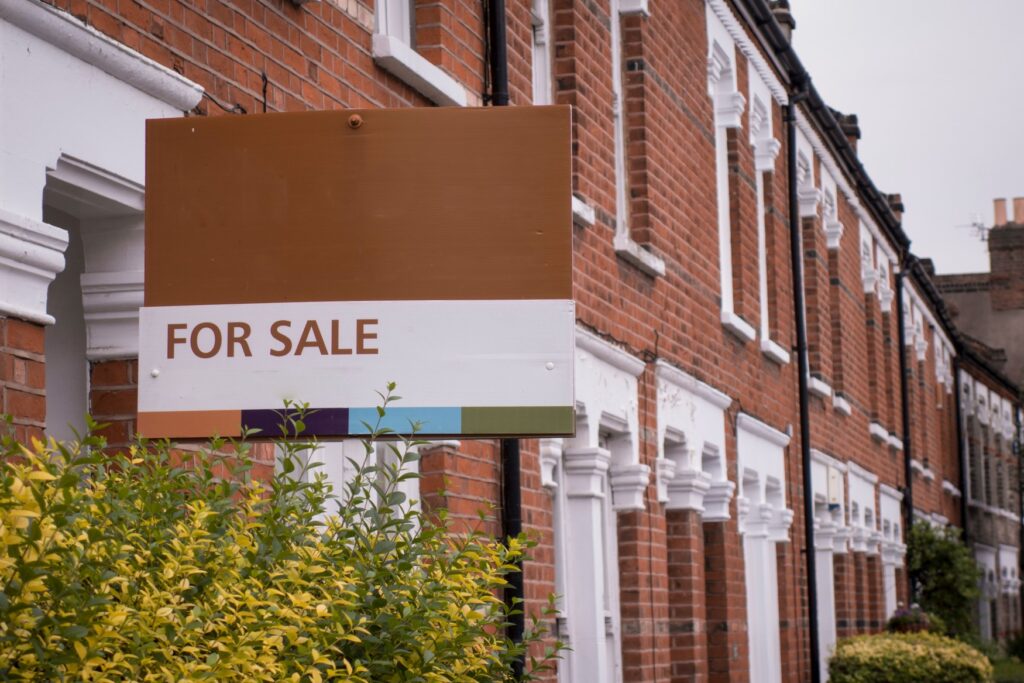
It seems that every government policy to help first‑time buyers get onto the housing ladder has in fact pushed up house prices even more! The average price of a property in the UK jumped by 10% to £253,000 over the year to December 2021. And that’s just the average. Try living in London, where poky properties passing as legal homes average over £500,000.
Swathes of twenty and thirtysomethings can’t get on the property ladder, and the disparity between house prices and wages may make your low salary seem like it’s the fundamental problem. House prices after all are 65 times higher than what they were in 1970, while wages are only 36 times higher.
It’s more complicated than that, as we’ll show, but this certainly doesn’t help.
A 10% deposit for the average house is now nearly as much as the average pre-tax salary. And since house prices grew by £24,000 this year, you would need to have saved £2,000 a month just to keep up, assuming you’re already at the borrowing limit for your salary level set by the mortgage lenders.
Industry guidelines say that mortgages should not be larger than 4.5 times a borrower’s income, so as prices rocket, your deposit has to cover the full amount of the price growth as the banks won’t lend you any more cash. But there has to be some kind of a limit to how much you can borrow, for simple affordability reasons, so it’s not the bank’s fault that you can’t afford a house. Something else is going on.
As a wannabe homeowner, you wouldn’t be blamed for thinking that the housing wealth of others is being protected above and beyond your need to get on the ladder.
As an investor in property following this closely, I’m inclined to agree with you! Why is it that the many government policies for helping first-time buyers never seem to actually… help? And are they in fact just making it worse? Let’s check it out!
If you want to grab some free cash, check out the Offers page. Loanpad, EasyMoney and Octopus Energy and others are all giving away £50 in welcome bonuses. FreeTrade, Stake and others are giving away free stocks potentially worth hundreds of pounds there too. Capital at risk when you invest, T&Cs apply.
Alternatively Watch The YouTube Video > > >
#1 – Scrapping The Stress Test
This first one’s not the government’s fault, but the devolved Bank of England’s. They have confirmed plans to scrap the rate rise stress test for mortgage borrowers, making it easier for you to get a bigger loan. The test checks if borrowers could still afford the mortgage in the event of an interest rate rise of 3%.
It’s great news for people looking to buy right now, since removing this restriction would make it easier for borrowers to take out larger mortgages, helping those who were stopped from buying a house by this rule.
But it’s terrible news for those still saving up for a deposit. That’s because mortgage experts have warned that bigger mortgages would also send house prices even higher than they are already.
Simple market forces mean that when buyers have more cash at their disposal due to a bigger mortgage, sellers will put up their prices to match.
#2 – Help To Buy
Now we turn to the government’s flagship policy to help first-time buyers: the Help to Buy equity loan. This has allowed homebuyers to borrow up to 20% (or 40% in London) of the cost of a new build property from the government, reducing the size of the mortgage needed. Users of the scheme could also get away with having a deposit of just 5%.
Lower mortgage, lower deposit. Sounds good in theory, but there were effectively no limits on the amount of money that builders could make from the scheme, and the ticket price of new builds went up accordingly. New builds already have a premium built into the price, so you have to wonder whether this type of scheme really helps first-time buyers onto the property ladder.
Plus, a study from the National Audit Office found that the scheme mainly supports buyers who do not need the money, and crucially, has helped to inflate already high property prices.
As a side note, we must point out that there’s no equivalent help for people who currently do not own a home but have in the past. People who’ve broken up with partners for instance might be in the same or a worse situation financially as a first-time buyer and in the same age bracket but get zero help back onto the housing ladder.
#3 – The Stamp Duty Holiday
This next one’s on Rishi – it’s clear that the stamp duty holiday during the pandemic, which meant there was no stamp duty on properties up to £500,000, helped to push house prices to new records, and they never went down again once the holiday was ended.
This one must be particularly irritating to first-time buyers because they already pay no stamp duty on houses worth up to £300,000, so this policy only helped existing homeowners, while pushing up market prices for everyone.
Existing homeowners had the chance to save up to £15,000, while the market for everyone has risen by £24,000 in the last year alone.
#4 – Lifetime ISAs
In what is perhaps the best policy idea so far, the government’s introduction of a Lifetime ISA gets less and less helpful as house prices rise. The Lifetime ISA gives a 25% bonus on savings for a house deposit, but stupidly it has an arbitrary cap meaning you can only use it on properties worth £450,000 or less.
The insane part of this cap is that the benefits aren’t even pro-rated! If you buy a house worth £451,000, you cannot use the Lifetime ISA at all – you lose your built-up 25% bonus, and you have to pay a penalty to access your money! That limit, by the way, has stayed the same since it was introduced in 2017. If it had risen with house prices, it would now be £549,000.
If you live in an area where house prices are around £400,000, there’s every chance that they could have risen to the cap of £450,000 by the time you’re ready to buy a year or so from now, completely scuppering your chances of buying if you’re saving within a Lifetime ISA.
We could tell you to move somewhere cheaper, but how far should you be expected to move out of the cities? Londoners will be living in the Scottish Highlands before much longer.
#5 – Planning Law Shake Ups Cancelled
What home buyers really need from the government is not another tweak, or tool, but for it to build some more goddamn houses. In 2021 the government was gearing up, finally, for a major overhaul of the planning system, the biggest barrier to home building.
But… the plans were abandoned after the Tories lost a by-election, since the affluent voters in the area who failed to vote Tory were unhappy with houses being built in their area.
#6 – Low Interest Rates
This next one’s on the Bank of England, but it wasn’t really their fault, given the circumstances. Between 2007 and 2009, given the financial world was burning around them, the Bank lowered interest rates from 5.75% to 0.5%.
This helped to fix the economy but caused house prices to rocket. What really matters with house buying, aside from the initial deposit, is the affordability of the monthly payments.
A £600k house with a 10% deposit might require a mortgage payment of £2,000 a month when the base rate is at 0.25%, whereas in 2007 that house could have been worth just £320k and still have cost you the same in terms of your monthly budget when the base rate was 5.75%. When rates were lowered, simple market forces ensured that the prices of houses, which are in limited supply, rose in line with monthly affordability.
#7 – Brexit
This next one is a mixed bag of good and bad news for aspiring home buyers. Let’s start with the good news.
The irony of Brexit is that Londoners who were most in favour of open borders immigration will be the ones who benefit the most by a fall in house prices if the population size of the UK were to decrease or even if growth slows, which is more likely.
In the UK, in the 10 years leading up to the 2008 financial crisis, house prices tripled. That’s largely because for every 4 new people that entered the economy through population growth and immigration, only 3 new houses were built. Simple supply and demand.
Brexit is also believed to be a major factor involved in the recent pay rises seen across the UK – a double edged sword, because house prices can rise further still if some people are being paid more highly. But if you did get a significant pay rise this year, you might be better able to save for a deposit.
If, however, you’re one of the unlucky people who did not get a pay rise in the last year, houses will still have risen slightly due to those who did now being able to afford a bigger mortgage, but your wage still sucks. As we said, a mixed bag.
#8 – Lockdowns
While a dwindling number of people still think the lengthy lockdowns didn’t cause any harm, there’s no doubting that this government policy had a seismic impact on the housing market.
Home workers, cooped up all day, probably already realised that their houses were too small to live in comfortably… but were forced to confront this reality when they were stuck in it 24/7. The demand for spacious family houses has skyrocketed. It’s no longer just about supply of housing, but also a matter of quality, and space.
#9 – Stamp Duty For Pensioners
We hate stamp duty in general and have moaned about it often on this channel because it’s a transaction tax that interferes with what should be a free-flowing housing market. If there’s one area where stamp duty is holding back the property market the most, it’s when it’s charged to pensioners.
As we just discussed, people now care more than ever before about the quality and size of their home. But a huge chunk of the 4-or-more bed family homes are in the hands of older couples whose kids have long since grown up and flown the nest.
If these people could be incentivised to downsize and give up their huge houses so that a young family could move in instead, it would vastly increase the supply of quality family homes and bring prices down.
However, the government actively disincentivises pensioners from moving home, because if they did, they’d be instantly whacked with a huge stamp duty tax to pay. An older couple moving from a £500k 4-bed house to a £400k 3-bed house would have to pay stamp duty of £10,000! No wonder they don’t downsize.
Reasons To Be Cheerful
It’s not all bad news for aspiring homeowners. Thanks to the tax rises and energy price increases heading our way in April, we’re all about to made poorer… great news for house prices!
Ironically, when everyone has less cash, house prices go down to meet what the most well-off savers can afford to pay. The cost of living crisis might actually precede a slight fall in house prices. Yay…
There’s also the prospect of further interest rate rises this year, which will increase your mortgage interest but… it will also lower everyone’s affordability calculations and hence the amount the banks will lend, and therefore lower the maximum market prices that properties can be sold at. Silver linings, eh?
Do you own, or are you still saving up? How hard has it been for you? Join the conversation in the comments below!
Written by Ben
Featured image credit: William Barton/Shutterstock.com
Also check out the MoneyUnshackled YouTube channel, with new videos released every Wednesday and Saturday:





